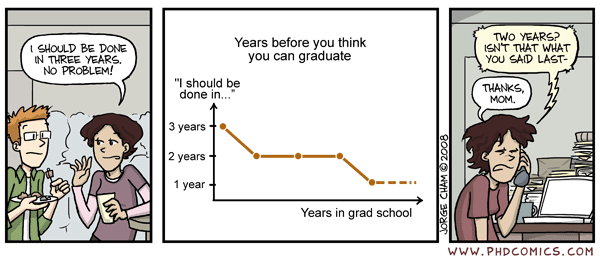Concerns on the graduate student dropouts in Malaysia
This topic has been lingering in my mind for awhile now. For the past few months, I talked to several students regarding their choices to drop out of their graduate programs. My 4-year PhD experience tells me that at least half of the graduate students in life sciences never complete a degree. I tried to make a list of students I know who dropped out of graduate school. I stopped counting at ten because the list just gets longer and longer. Majority of them quitted during the first year of involvement. I would use the word “involvement” rather than referring to a formal graduate program because some students stopped before starting a research program. These can be students who are preparing research proposals or working as a research assistant for 6-12 months with the intention of doing a postgraduate study.
Why students hesitate?
Let’s look at some online facts
- The dropout rate for postgraduate students are generally around 50% and lower in science subjects
- According to Chronicle of Higher Education (2004), 37% of students who begin PhD never obtain the degree.
- Women drop out at a higher rate than men (Chronicle of Higher Education, 2004).
- Around 25-29% of PhD students in life sciences dropped out according to Elearners.com.
- No comprehensive national statistics is available in Malaysia. In 2011, New Straits Times reported that 3 out of 10 part-time PhD students never complete due to work and family problems.
Why students hesitate?
1. Timely completion. I think slow progress or not getting the
expected results is the main reason why many students gave up. They might
think that a specific task is too daunting or impossible to complete. They do
not have confidence in overcoming the problems or getting help from others. In
addition, some students hold unrealistic expectation to complete their degrees
within a short period of time, say three years sharp for a PhD. They might be
afraid of financial or visa problems if they do not complete within time. This eventually
gives rise to other problems because more importance is placed on speed rather
than quality of the research.
2. Commitment and interest. Most students want to join a
postgraduate program because they are interested in science and research but that interest can change over time.
Some might want to improve the chances of finding a job, some dream of getting
a higher degree and some hope to work in the academics. They might find that doing a postgraduate program is no
longer suitable. They did not obtain the results or satisfaction they expected. They might join a program without
fully understanding it and leave when they fully understood it.
3. Money. Money is the problem in some cases. I think that stipend and debt such as study loan pose very little problem because postgraduate students in Malaysia usually receive a monthly stipend more than sufficient to cover their living expenses and tuition fees. A lot of students worries over grant and research funding. Is it going to run out soon? Will I be able to buy the kits and consumable needed? Will the grant able to support me until I graduate? I think it is supervisor’s responsibilities to obtain grants and ensures the students that they will have sufficient materials, resources and financial support to complete a degree. When the students think that there is nothing they can do, they choose to leave.
4. Interaction with supervisor. The quality of relationship between
student and supervisor is often cited as the heart of the problem. It will take
several years to foster good relationship and trust between the two parties. This
relationship is usually weak during the first year when most dropouts occurred.
One common problem I spotted is students are often too timid to discuss
problems with their supervisors and worry too much of what their supervisors might
think.
5. Pressure to publish. Nowadays students faced increasing pressure to publish their researches because publishing has been made compulsory to graduate. In UKM, Master and PhD students are required
to publish one and two papers respectively in scientific journals. Some of
their worries are related to timely completion, getting enough data for a
publication and fear of being rejected by a journal. I strongly support this
policy because most students who graduated without publishing never publish. In
addition, I think publication will give the students greater satisfaction and
motivation to thrive in their researches.
6. Family. Family commitment,
getting married and starting new family are some reasons students dropped out
of graduate school. Some students especially young ones find it difficult to
cope with family and studies simultaneously. Few might need to sacrifice their studies for their spouses. Only
the determined students who received great family support can successfully
completed their studies. Based on my personal observation, students with family
commitment who are sponsored by an institution or company to pursue a higher degree
are less likely to drop out but most likely to extend the semesters.
My advices for the hesitating
- Identify what makes you hesitate
- Think about why you want to get a Master or PhD degree. Do you still want it now?
- Seek advices from your supervisor early on. Once you have identified the problems you faced, I strongly recommend that you let your supervisor know so he/she can help you.
- Seek advices from other graduate students. They are often more than willing to share their personal experiences, give technical advices and tips on how to improve communication with your supervisor and others.
- Take a holiday if you find that work is stressing you out a lot. It’s time to take a break if you keep repeating a certain experiment and unable to get any result. It is important to have a well-balanced work and life.
- Get emotional support from friends and family. Let them understand that doing a postgraduate study can be a long and stressful process.
Possible future solutions
Some solutions to reduce the high
dropout rates in PhD students have been proposed in the articles I read online.
First, there is a need for proper statistic on the actual number of PhD dropouts.
A problem well-defined is a problem half solved. Another suggestion is to choose
only the best student for PhD programs. The percentage of students completing a
PhD increases to 70-75% after vigorous selection of the scholarship committee.
In China, students are required to take an entrance exam to enroll into
postgraduate programs from the Chinese Academy of Sciences. This is similar to Graduate
Record Examinations (GRE) which is compulsory to pass for all international students before joining universities in Singapore and United States. One author
suggested that sufficient training in time management and manuscript/thesis
writing will curb the problem. One of my suggestions is to strengthen bonds and
relationships between postgraduate students through activities organized
by the graduate student association. In order to prevent dropouts under the
Graduate Research Assistant (GRA) scheme, perhaps there is a need for the
students to sign a contract which requires compensation if the student did not
complete the study.
The scenario of life sciences
research in Malaysia is changing rapidly over the past few years. Nowadays principal
investigators are more concerned about meeting milestone deadlines, pressure in
publishing and competition in grant writing. A few years ago, it is very rare to
hear that a postgraduate student was fired due to poor performance but I expect
things to change pretty soon.






1 comments:
Dear Melisaa,
I would like to share this in my facebook. Hope u don't mind. Thank you.
Post a Comment